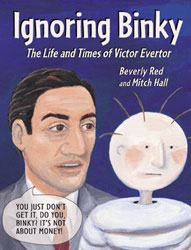

| Ignoring Binky: The Life and Times of Victor Evertor. By Beverly Red and Mitch Hall. Vergennes, VT: Checkmate Press, 2001. 60p. $10.95. ISBN 0-9708092-9-8. |

|
GENRES: AUDIENCE: SYNOPSIS: Eventually he becomes a cadet at "Pointless University, a military academy in Vermont," where he develops a circle of friends who, in later years, will form part of a good ol' boy's clique that helps its members get ahead. He learns to hunt; joins a secret society, the "Skull and Sabers"; and gets away with plagarism by claiming that "I don't believe you need your own ideas. It's what you do with ideas that counts." An accomplished bullshitter, he lies all over his resume, but what gets him his first job is his membership in the Skull and Sabers. The job is in public relations, of course. Hungry, he fights, lies, and backstabs his way to prominence, soon becoming vice president in charge of PR. The occasional bad dreams and notes of warning from Binky have little effect on his behavior. Meanwhile, Mike has gone in almost the opposite direction: a drunken slob, he fought in 'Nam and has a slightly more realistic view of the military than Victor: When Victor asks what it's like on the front lines in 'Nam, Mike replies, "Well, um, we're burning villages, killing women and children, and mainlining drugs. You know, the usual." Victor, good little hawk, is incensed at these "lies." Victor has by now been married for some time, but his wife Mary is becoming increasingly disturbed by his maneuvering and workaholism. In 1971, she joins the burgeoning women's movement and begins to defy Victor's commands. At the same time, Mike becomes a hippie and joins the antiwar movement. In the mid-70s, Mary gives birth to three girls over three years, then has her tubes tied, which infuriates Victor, who wanted a boy. Their relationship deteriorates, and Mary starts to drink. Meanwhile, Victor's company, EATU (Evertor Advanced Technologies Unlimited), is spreading its tentacles, getting into mining, waste disposal, etc., with little regard to environmental damage it does. Then, while on an elephant hunt, Victor decides to steal someone else's idea: barcode tattoos. His goal is to force everyone to have one of these tattoos in order to do anything--buy stuff, watch TV, etc.--and to drive the rival BARbicode out of business by putting his BiCODE machines in more places. This scheme makes him a billionaire. However, Mike and his friends, increasingly sickened by the reckless behavior of CEOs and their companies, develop a scheme of their own: they create an organization called Checkmate, and then they go around branding CEOs with dollar signs on the forehead. They also succeed in turning public opinion against BiCODE. Victor's public image is increasingly bad, especially after he divorces his wife and marries a girl half his age. But even after he's branded and has a heart attack, he won't settle down, won't accept medical help--and as Binky sadly notes, "He just doesn't get it." The book ends with an "Epilogue 1998" in which the characters (including two dogs, one of which couldn't be awaked for a comment) all speak to the authors. Not surprisingly, Victor says, "You'll be hearing from my lawyers." There are also an introduction about the work that the authors put into researching the book, and a "more information" form for the Checkmate organization, which is a real environmental organization, though as far as I can tell the members don't go around branding CEOs. (BTW, "Evertor" is a variation of the Latin eversor, which means subverter/destroyer) EVALUATION: Binky is an interesting literary device, a sort of helpless Jiminy Cricket/Charlie Brown figure who rarely gets through to his charge (hence the title of the book), though on occasion his words hit home. He's drawn deliberately unrealistically, with a vaguely cloudlike body and round head to set him off from the "real" characters. He seems to be the symbol of Checkmate; you can buy environmentally friendly Binky Bags from the publisher as well as the book. The black-and-white art is kind of crude, but the authors' understanding of the technique of sequential art, and their overall creativity, makes up for a lot. I like, for example, the occasional symbolic transformations that Victor goes through--becoming a clown when he talks cloddishly, or a wolf when he talks sexist. I'm not real enamored of the lettering, though. There are several instances when a bit of dialogue is awkwardly broken into two word balloons, by which I mean that a sentence was cut in two in a place where there wouldn't naturally be a pause if someone was speaking that sentence. Also, someone decided that "fuck" should be spelled "f__k" whenever it was used, but considering the common use of other swear words in the book, not to mention the depiction of a few mild bits of anatomy (e.g., Victor peering out from his mother's body), it seems unnecessarily prudish. Books like this prove that the graphic novel format can be extremely effective in presenting political ideas. Recommended for YA-level readers and up, especially people interested in environmental issues and corporations. However, the art might be a turnoff for readers who are more comfortable with the flash and glitter of mainstream comics. That would be a shame; this is a book worth reading. |
Return to Rational Magic Home
